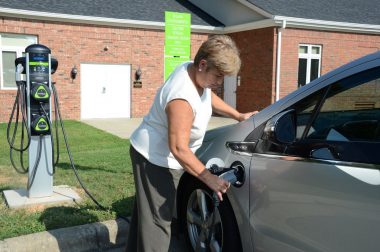Elon employees are helping to reduce emissions by driving electric vehicles.
 A total of 110 miles on one gallon of gas?
A total of 110 miles on one gallon of gas?
Jan Pagoria, Director of Internships in the Love School of Business, owns a hybrid electric car. By the time she finishes her 110-mile, round-trip commute she will have used slightly more than a gallon of gas. A total of 80 miles of her commute is powered with electric, which her car gets from the recently installed ChargePoint Electric Vehicle (EV) charging station in the McMichael parking lot.
In a single day, if all faculty and staff drove to work in a car, they would cumulatively travel more than 39,000 miles and emit more than 700,000 pounds of carbon dioxide per day. According to the 2012 Commuter Habit Survey, commuter travel accounted for about 10 percent of Elon’s greenhouse gas emissions. Elon is aiming to achieve carbon neutrality by 2037. One way to reduce emissions is to use electric vehicles.
For every gallon of gas burned (in a gas vehicle that gets 27.5 miles per gallon), 20 pounds of carbon dioxide are emitted. For every kilowatt-hour of electricity consumed, 1.03 pounds of carbon dioxide are emitted. So an electric vehicle that uses 34 kilowatt-hours per 100 miles emits about 35 pounds of carbon dioxide. Comparatively, traveling 100 miles in a car that gets 27.5 miles per gallon emits more than 72 pounds of carbon dioxide.
In addition to benefiting the planet, operating an electric vehicle can also benefit your pocketbook. For example, Pagoria’s vehicle gets about 40 miles per charge and takes four to five hours to charge completely. Depending on electricity rates and agreements with where she is plugging in, Pagoria may pay zero to $1.50 per charge. Compare that to paying $5.09 to go the same distance in a car that gets about 27.5 miles per gallon with gas that costs about $3.50 per gallon.
While Elon is open to adding more stations if there is enough demand and is willing to take a leadership role in reducing greenhouse gases, emissions from commuting will only decrease when more community members like Pagoria use the service.
“I believe that taking this step demonstrates, once again, just how much of a leadership role Elon plays in the local and global community,” Pagoria says.
It All Adds Up
Sustainability is a university-wide initiative and Elon needs your help to achieve its goals.
Elon has a goal of carbon neutrality by 2037. Since 10 percent of emissions are from commuter travel, you can help. Put these numbers in your contacts. They are for the Emergency Ride Home Program. If you walk, run, use transit, bike or carpool to work and have an emergency, you can get a free ride home.
- Business hours: 336-291-4321
- After hours: Ruby Gatewood-Randall 336-830-1489; Chantale Wesley 336-307-8115
- Consider purchasing a Low-Emitting Vehicle (LEV)
- Consider purchasing an electric vehicle and using Elon’s ChargpPoint station
Your Voice
Share your stories, photos, tips and suggestions. To nominate the next Elon STAR or to learn more, visit elon.edu/sustainability, facebook/ElonSustainabilty, @SustainableElon or contact us .
About Elon STARS: Sometimes we see stars, sometimes we don’t, but they are always there. So it is with daily opportunities for contributing to sustainability. This series highlights actions of Elon community members doing their part to integrate sustainable practices at Elon. STARS also stands for the Sustainability Tracking, Assessment and Rating System used by Elon and other higher education institutions to measure and monitor sustainability in all aspects of higher education.
For more information:


